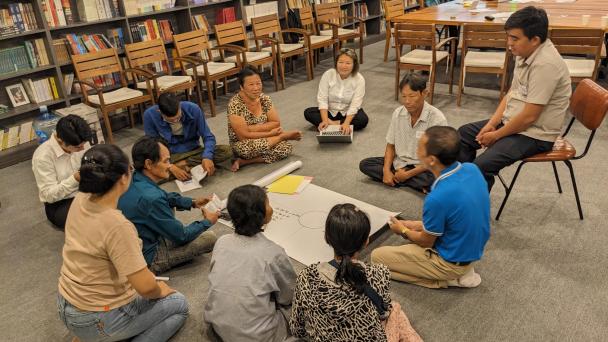The dilemma of local government reform: How to balance efficient services and local needs?


Deliberation gives people the time, space, and good conditions to reflect on complex policy and research questions. The outcomes of deliberations can offer an additional source of informed input to the evidence decision-makers draw on.
Media commentators often tend to focus on what’s at the surface of deliberative outcomes, such as voting results. This is understandable, not least because we are used to hearing reports of opinion polls. It is also because governments commission most of the high-profile deliberations to feed into political processes. For example, the Irish citizens’ assemblies on abortion and same-sex marriage were followed by national referenda on the same topics.
However, large groups reflecting on complex topics generate a lot of data; recordings of conversations, votes on preferences, not to mention mountains of post-its!
Well, sometimes, people do dig below the surface. For instance, a French Government deliberation on assisted suicide and euthanasia dedicated half of its final report in 2023 to the minority view among participants. With a topic as sensitive, complicated, and divisive as this, policymakers (and the rest of us) only benefit from looking at the nuance of discussions had, rather than just people’s final positions.
At the Centre for Deliberation, we know that the data deliberative processes produce along the way to their conclusions can offer rich insights. This was evident in a 2023 citizens’ jury we ran for the Centre for Inclusive Trade Policy (CITP). We brought together 113 members of the UK public to learn about trade policy, deliberate about what they thought was the best response to a range of scenarios policymakers face, and share their views on how trade decisions should be made.
Following this, we published a research report which helped us tell the story of the jury’s outcomes and how these emerged. We also provided CITP with the deliberation data so they could dig a bit deeper.
Here, we look at what we learned from the public in their deliberations, what CITP have learned since, and what this can tell us about the value of deliberative research more widely.
Some of what we learnt did focus on tallying votes. For example, we posed a range of specific trade scenarios to participants to track how they responded. We also varied features of these scenarios to explore whether and how this affected people’s preferences.
An example of people’s votes on a scenario which explored a fictional trade deal that would have implications for different job sectors and regions in the UK.
Votes alone couldn’t tell us the whole story, so we also analysed participants’ reasoning recorded in their handwritten notes. We unearthed four main rationales: the fairness of a deal for different groups; whether it was in the national interest of the UK/a trading partner; whether it was in the regional interest of parts of the UK; and the long-term outcomes for the UK/trading partners.
We also looked at who participants thought should be making trade policy decisions. They prioritised the UK Government and international organisations, but they did not choose the former out of deep trust. Instead, this prioritisation reflected their recognition of where trade decision-making power actually lies in the UK. In contrast, prioritisation for international organisations reflected a desire for ensuring rigorous standards in trade and arbitration on trade issues.
In a paper published in July 2024, the first of several planned for this year (see their site for updates), CITP drew on different methodologies to look more closely at the transcripts of participants’ deliberations.
They observed that participants engaged in a great deal of “hedging, rephrasing, and negation” during discussion. This is to be expected where people are engaging with a topic they are less familiar with. However, despite people’s greater knowledge of trade by the close of the process, the continued presence of doubt in conversations reaffirms something we, as facilitators, observed. Namely, participants had come to appreciate just how complex the trade-offs involved in trade policymaking can be.
A related finding is that a “frequent cry” from participants was the need for the Government to have access to expert information and advice on trade. CITP used this analysis to suggest how to better institutionalise a source of independent and reliable advice for policymakers on trade policy matters.
This finding builds on our insight that participants reluctantly placed decision-making power in government hands. Specifically, CITP highlighted how participants’ new appreciation for the complexity of trade made them place more weight on the importance of decision-makers being well-informed about trade policy.
Deliberation data holds more potential than one might think. Both our and CITP’s analysis highlighted how the conclusions participants reached could be illuminated further. Nor was this just an intellectual exercise, as CITP used this to indicate a specific recommendation for reforming trade policymaking.
A number of things would help us better tap into the data generated from deliberations, such as reassessing how deliberative case studies are archived and analysed. But the first thing to do is to simply realise the potential is there below the surface. So, shall we get digging?




Receive a regular update, sent directly to your inbox, with a summary of our current events, research, blogs and comment.
Subscribe